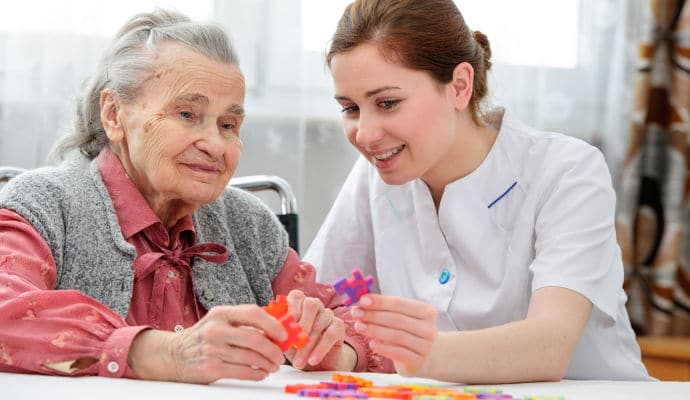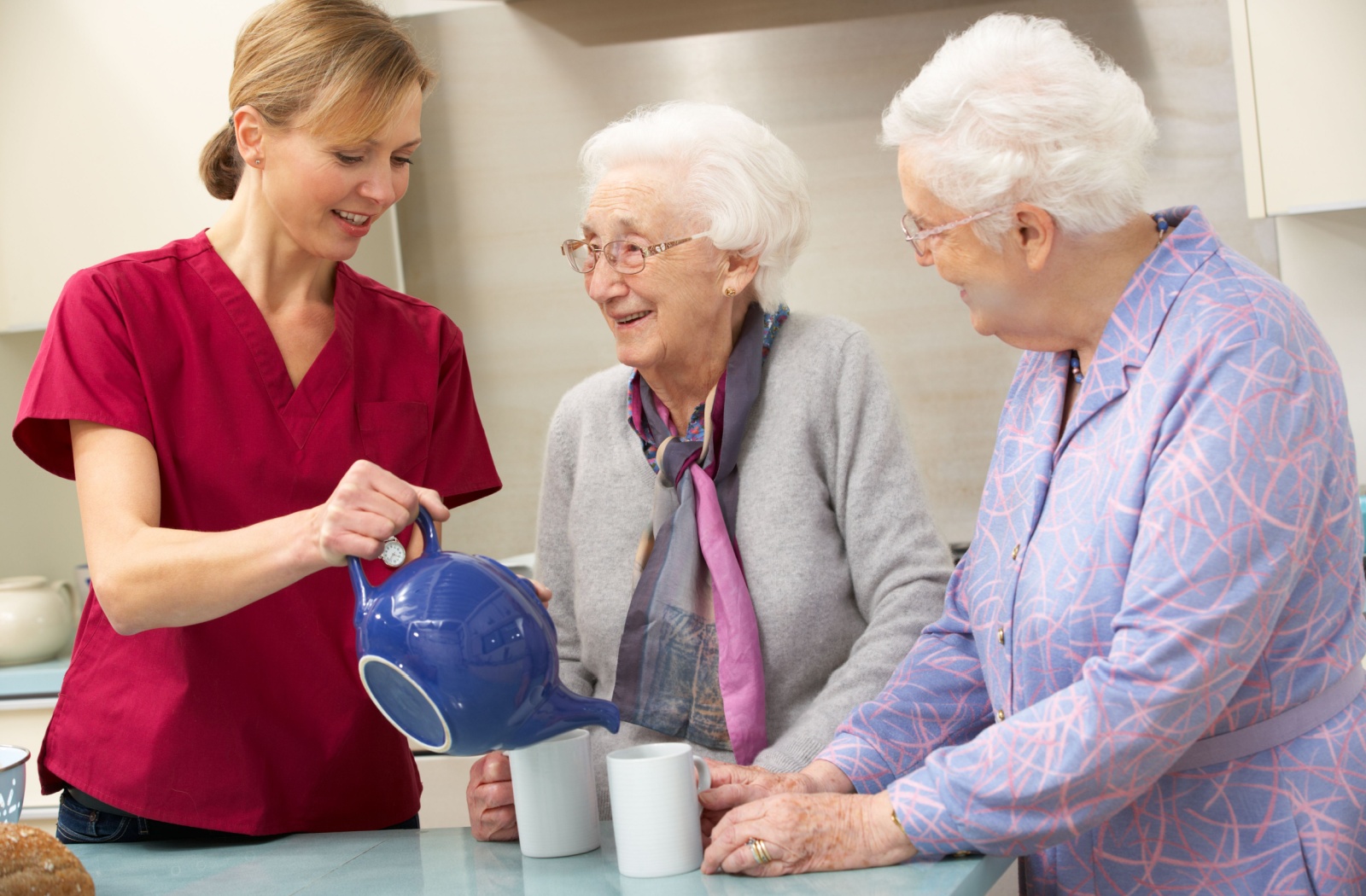Trusted Support and Compassionate Solutions for Alzheimers Care Charlotte
Trusted Support and Compassionate Solutions for Alzheimers Care Charlotte
Blog Article
Creating a Safe and Helpful Atmosphere for Alzheimer's Care
The creation of a secure and encouraging environment for individuals with Alzheimer's is extremely important in enhancing their quality of life. This includes not just physical adaptations within the home, such as lessening dangers and integrating familiar components, however likewise the implementation of structured regimens and meaningful activities that cater to their cognitive needs. Moreover, recognizing the psychological and psychological measurements of treatment can considerably impact their complacency and link. Checking out these complex strategies can expose essential insights into effective caregiving strategies that may transform the daily experiences of both people and caregivers.
Recognizing Alzheimer's Needs
Regularly, individuals with Alzheimer's illness show a variety of demands that call for customized strategies to care. As the problem proceeds, cognitive decrease materializes in different methods, impacting memory, reasoning, and also the capacity to execute day-to-day tasks. Caregivers should recognize these developing needs to give ideal assistance and guarantee a higher top quality of life for those influenced.
One essential facet of comprehending Alzheimer's requirements is recognizing the importance of regular and experience. Individuals often locate comfort in recognized patterns, which can reduce anxiousness and confusion. Caregivers ought to strive to develop structured daily routines that include purposeful activities aligned with the person's rate of interests and abilities.
Furthermore, effective interaction is paramount. People with Alzheimer's may have a hard time to reveal themselves or comprehend complex language. Caretakers should utilize easy, clear language, use non-verbal signs, and method active listening to promote understanding and link.
Finally, social and psychological requirements can not be overlooked. Supplying chances for social interaction and keeping partnerships can considerably enhance emotional health. Caretakers need to urge interaction in area tasks or family celebrations, promoting a sense of belonging and function. Comprehending these diverse needs is vital for developing an encouraging treatment environment.
Creating a Safe Home
Developing a secure home for people with Alzheimer's disease is essential to advertising and decreasing dangers independence. The design of the home ought to prioritize safety and security while permitting personal convenience. Get rid of potential risks such as loose carpets, sharp things, and mess, which can lead to falls or crashes. Ensure that pathways are clear and well-lit, as appropriate illumination decreases disorientation and improves flexibility.
Integrating adaptive features is likewise crucial. Set up grab bars in bathrooms and near stairways, and take into consideration making use of non-slip mats in damp areas. Furthermore, using different shades for floors and walls can assist in identifying spaces, helping to mitigate confusion.
Familiarity is essential for individuals with Alzheimer's. Individualizing the environment with familiar objects and photos can reinforce a feeling of belonging and safety - Alzheimers Care Charlotte. It is additionally valuable to have an assigned area for everyday activities, such as analysis or crafting, which can give framework to their day
Lastly, executing a safe and secure outside space permits safe expedition while linking with nature. By attentively designing the home setting, caregivers can substantially boost the lifestyle for people dealing with Alzheimer's illness.
Enhancing Interaction Abilities

Non-verbal communication, consisting of faces, gestures, and touch, plays a critical function in sharing empathy and understanding. Maintaining eye get in touch with and a tranquil attitude can boost the comfort level of the person, promoting a sense of safety and security.
In addition, it is important to practice active listening. This involves being fully existing, showing persistence, and permitting the individual to share themselves without interruption. Repeating may be required; caregivers need to be prepared to review subjects or questions, as individuals with Alzheimer's may have problem with memory recall.
Additionally, utilizing aesthetic aids or cues, such as pictures or familiar items, can help with recognition and involvement. Eventually, enhancing interaction skills is concerning building depend on and developing an environment where people really feel heard, valued, and recognized, thereby enriching their high quality of life.
Motivating Social Communication
Cultivating significant social interactions can greatly improve the well-being of individuals with Alzheimer's disease. Engaging with others not just aids combat sensations of seclusion however also stimulates cognitive function and emotional wellness. Structured social activities, such as group games, arts and crafts, or songs therapy, produce possibilities for citizens to visit the website attach with peers and caretakers, which can result in enhanced state of mind and lowered stress and anxiety.
Creating a welcoming atmosphere that urges socialization is crucial. This can be accomplished by setting up communal spaces that assist in communication, such as comfortable seating locations or activity areas. In addition, incorporating familiar and culturally pertinent tasks can motivate and spark memories engagement, allowing people with Alzheimer's to really feel have a peek at this site more linked to their past experiences.
In addition, caretakers should be trained to identify and advertise social involvement among locals. Straightforward motions, such as initiating conversation or helping with little team discussions, can aid individuals really feel valued and consisted of. Frequently arranged gatherings ought to correspond yet adaptable, accommodating varying levels of ability and interest. By prioritizing social interaction, we can substantially enrich the lives of those living with Alzheimer's, cultivating a sense of area and belonging.
Supporting Caregiver Wellness

To sustain caretakers, companies must use normal training and instructional resources to enhance their understanding of Alzheimer's disease and caregiving strategies. Providing access to respite care services allows caregivers to take essential breaks, minimizing stress and anxiety and fatigue - Alzheimers Care Charlotte. Additionally, promoting a neighborhood through assistance groups can assist in emotional sharing and the exchange of functional guidance among caretakers, creating a network of shared support
Mental health resources, such as counseling solutions, can also be vital in dealing with the psychological toll caregiving can take. By prioritizing caregiver well-being, we create a more sustainable caregiving atmosphere that not only benefits view the caretakers themselves however also boosts the overall high quality of care obtained by individuals with Alzheimer's. Ultimately, supporting caretakers is a necessary part in cultivating a caring and reliable treatment setup.
Verdict
In verdict, the production of a supportive and safe environment for individuals with Alzheimer's is vital to enhancing their lifestyle. By focusing on safety and security with thoughtful design, cultivating psychological health with acquainted aspects, and advertising interaction through structured regimens, caregivers can substantially affect the general experience of those influenced by this condition. Furthermore, sustaining caretaker well-being is essential, as it eventually adds to a much more compassionate and effective care atmosphere.
Rep may be needed; caregivers need to be prepared to revisit inquiries or subjects, as individuals with Alzheimer's might struggle with memory recall.

Report this page